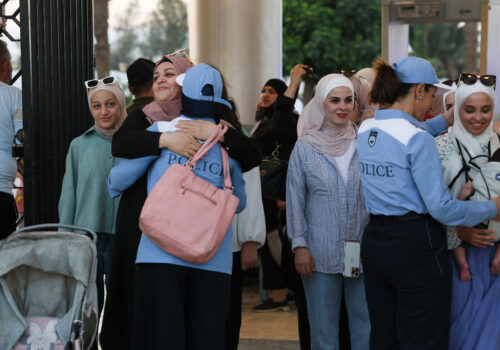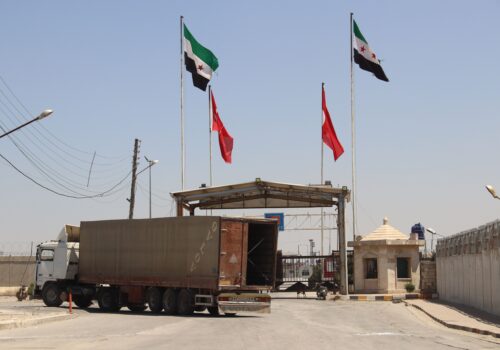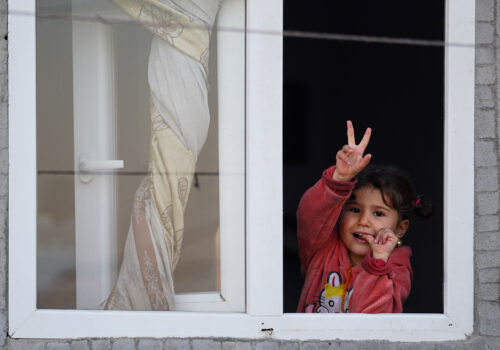Syria joining the anti-ISIS coalition is a westward pivot—with opportunities and risks
On November 10, Syrian President Ahmed al-Sharaa made a historic visit to Washington, becoming the first Syrian leader to meet a US president in the White House since the country’s independence nearly eight decades ago. The visit was the highlight of several policy decisions US President Donald Trump’s administration took this month to reinforce Washington’s commitment to supporting al-Sharaa in his bid to rehabilitate and rebuild Syria.
These key decisions include removing al-Sharaa from the Specially Designated Global Terrorist list, renewing the pause on Caesar Act sanctions to help spur investments, and allowing Syria to reopen its embassy in Washington to “exercise its diplomatic role with full freedom on US soil,” as Secretary of State Marco Rubio noted. Both are important and strategic gestures highlighting where the United States stands on Syria’s future.
Syria’s head of state did not come empty-handed to the White House meeting. One day after al-Sharaa’s visit, the US embassy in Damascus announced that Syria became the ninetieth member of the Global Coalition To Defeat ISIS. This marks a significant shift in Syria’s regional and international alignment—from one that was deeply seated in the Russian and Iranian spheres of influence under Bashar al-Assad, to its current position in the regional orbits of NATO allies and Gulf Cooperation Council (GCC) members. While US-Syria coordination against ISIS began shortly after Assad’s fall, in close cooperation with neighboring countries including Jordan, Iraq, and Lebanon, this formal participation underscores Damascus’s readiness and commitment to strategically partner with the United States, enhance its own security, and advance Washington’s counterterrorism interests in the region.
Nevertheless, Syria joining the coalition presents multifaceted opportunities, as well as key challenges and inherent risks—especially considering al-Sharaa’s violent jihadist background as head of Jabhat al-Nusra, which was Syria’s al-Qaeda offshoot earlier on in the country’s civil war.
Regional endorsements and emerging opportunities
The opportunities include the potential for increased intelligence sharing between Damascus and Washington. It also means enhanced military coordination and deeper regional cooperation in the fight against ISIS and other extremist groups rebooting in Syria. The intelligence sharing includes foreign fighter flows and money tracing, as well as disinformation and misinformation campaigns, according to former US diplomats familiar with the coalition’s work.
Diplomats from both Jordan and Iraq reinforced that Syria joining the coalition is a constructive and positive step toward enhancing their own national security interests, while strengthening Amman’s and Baghdad’s relations with Damascus. This is an important priority, especially for Iraq, given al-Sharaa’s violent past in the country amid the US occupation beginning in 2003. According to the authors’ diplomatic sources, both countries shared intelligence about one of the two ISIS plots to assassinate al-Sharaa, which the Syrian government announced on the heels of his historic US visit.
GCC members welcomed Syria’s entry into the anti-ISIS coalition. From the Gulf Arab states’ perspective, ISIS resurfacing is always a challenge, so having Syria on board is key to reducing the threat posed by the terrorist group.
The GCC states, particularly Saudi Arabia and Qatar, have played a significant role in persuading the Trump administration to view al-Sharaa as a legitimate and reliable partner. For example, Saudi Crown Prince Mohammed bin Salman’s influence was a factor contributing to Trump deciding to lift sanctions on Syria earlier this year. Gulf Arab leaders broadly believe that Syria should be reintegrated into the regional and international fold rather than left isolated. Without sustained external support and cooperation, officials across the GCC worry that the Syrian state could be too weak to govern effectively—creating power vacuums, and worsening economic and humanitarian crises that extremist groups like ISIS could exploit. In this context, Syria’s decision to join the coalition aligns with the Gulf states’ view that deeper international engagement with Damascus is essential to addressing the country’s challenges, including the renewed threat posed by ISIS in Syria.
That enhanced security cooperation also encourages the reopening of trade and transit routes, benefiting the Syrian economy through increased investment pledges beyond those already secured from key GCC members—namely Saudi Arabia, Qatar, and the United Arab Emirates. Further, coalition-related stabilization funds, channeled through the United Nations or regional bodies, could indirectly support reconstruction in areas previously liberated from ISIS if the right oversight mechanisms are in place. The coalition also oversees humanitarian and developmental assistance to the areas affected by ISIS.
Complexities, contradictions, and risks of partnership
There are also complexities tied to these opportunities. Partnering with a government that, to varying degrees, remains politically and ideologically contentious domestically in Syria presents potential pitfalls—especially given al-Sharaa’s past. This history drives a reluctance in the Syrian Democratic Forces (SDF)—the group most instrumental to fighting ISIS with the coalition—to integrate into the Syrian state. While some diplomats in Washington see this as an opportunity to nudge the SDF to accelerate its integration into the new Syria, other policy analysts believe Syria’s joining undermines the SDF’s role in the coalition. Nevertheless, from the perspective of key allies in the region, including GCC states, a unified Syria is key, and thus, working on SDF-Damascus integration should be prioritized.

Reactions from violent Islamist militias aligned with ISIS who see al-Sharaa as an “infidel” remain a significant risk: one that al-Sharaa is aware of. One preemptive and timely measure taken last week was the fatwa issued by Hay’at Tahrir al-Sham (HTS) mufti Abdullah Al Mheissni supporting Syria’s decision to join the coalition to beat ISIS, which he called Khawarij/Kharijites, or a group of heretics. The fatwa affirmed that the presence of the international coalition necessitates “organizing the situation and controlling matters to ensure unity of decision and sovereignty, until the new state’s conditions stabilize, and the threat of ISIS is not used as a pretext for greater interventions or infringement.”
Other key challenges include the enduring influence of certain pro-government militias in Syria, some of which appear to be ideologically tied to specific global terrorist organizations, as well as the relative fragility of Damascus’s political authority and the broader security landscape. Armed factions aligned with the Syrian Ministry of Defense, such as the Sultan Suleiman Shah Brigade and the Hamzat Division, were implicated in sectarian-motivated massacres of Alawites along Syria’s coast in March. Such actions may cast serious doubt on the wisdom of treating the new Damascus government as a trustworthy partner in the fight against a virulently sectarian Sunni extremist organization such as ISIS. Compounding these concerns is the reality that foreign jihadists from China, the Western Balkans, the North Caucasus, and other parts of the broader Islamic world now occupy roles within the Syrian state apparatus. Their backgrounds, affiliations, and ultimate loyalties remain opaque, further complicating the picture for al-Sharaa’s government.
It remains to be seen what Syria’s membership looks like in the coalition, which continues to operate without a formal charter, according to Jim Jeffrey, Washington’s former special presidential envoy to the coalition during the first Trump administration. As Jeffrey elaborated, active membership in the coalition includes two pillars: military and diplomacy. Most members designate a military representative to the coalition, which Syria has yet to name. Rotating foreign ministerial meetings make up the main function of the coalition’s diplomatic pillar, which Syria can most certainly participate in.
“For now,” Jeffrey noted, “Syria joining the coalition is largely symbolic as it is unlikely to contribute financially or provide troops.”
However, he adds, al-Sharaa and “his colleagues know something about fighting ISIS,” and can be constructive in future US-led operations against the terrorist group. According to our sources from the Gulf, Syria joining the coalition formalizes a relationship that began during the Assad years when HTS was the de facto government in Idlib, and it cooperated with the coalition at a time when HTS was successfully driving out al-Qaeda and ISIS elements in the province.
Ultimately, Syria’s entry into the coalition represents an opening for deeper cooperation with the United States and its regional partners. However, the challenges posed by sectarian militias and foreign fighters embedded within the state underscore how fragile and conditional this partnership could prove. Ultimately, the success of Syria’s membership in the coalition will depend not on symbolism alone, but on whether Damascus can demonstrate consistent, credible commitment to countering ISIS while stabilizing its fractured political and security institutions. Syria’s strategic partners in the region and globally should also support its efforts as it deepens its engagement with the coalition to eliminate the threat of terrorism once and for all.
Merissa Khurma is the founder and chief executive officer of AMENA Strategies, an associate fellow at the Middle East Institute, and nonresident fellow at the Baker Institute. She formerly headed the Middle East program at the Wilson Center.
Giorgio Cafiero is the chief executive officer of Gulf State Analytics, a Washington, DC-based geopolitical risk consultancy. He is also an adjunct assistant professor at Georgetown University.
Further reading
Wed, Sep 17, 2025
In landmark Syria elections, women still face electoral hurdles
MENASource By Marie Forestier
As the indirect electoral process begins, Syrian officials could take several steps to increase women’s chances in this process.
Wed, Sep 24, 2025
Is a new era of Turkey-Syria economic engagement on the horizon?
MENASource By
The convergence of Turkey's and the Gulf's economic strategies in Syria presents an opportunity for Washington.
Fri, Jun 20, 2025
On World Refugee Day, complexities persist for Syrian returnees
MENASource By Sinan Hatahet
While Syria's political shift brings new hope, it also highlights the complex realities that still define the Syrian landscape.
Image: Syrian President Ahmed al-Sharaa greets Syrian community outside the White House after meeting U.S President Donald Trump on Monday Nov 10, 2025 - the first such visit from a Syrian leader in the country's history. Trump has expressed his support for al-Sharaa, who until recently was designated a terrorist by the US government.



